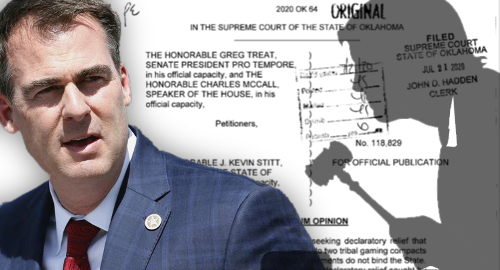 Oklahoma’s tribal sports betting plans have been put on hold after the state’s top court said the governor had exceeded his authority.
Oklahoma’s tribal sports betting plans have been put on hold after the state’s top court said the governor had exceeded his authority.
On Tuesday, the Oklahoma Supreme Court issued a 7-1 ruling striking down the gaming compacts Gov. Kevin Stitt signed with two Native American tribes in April. The Court ruled that Stitt lacked the authority “to bind the State with respect to the new tribal gaming compacts with the Comanche Nation and Otoe-Missouria Tribes.”
Stitt’s deals with the two tribes – which allowed them to offer on-site sports betting, house-banked card and table games and to build new casinos off tribal lands – were immediately attacked by other state officials, including Attorney General Mike Hunter, who claimed Stitt was both exceeding his authority and undermining the legislature’s.
While Stitt’s plans received the blessing of the federal Department of the Interior, they caused a rift with the state’s other gaming tribes, with which Stitt was fighting in court over gaming compact renewals. The Oklahoma Indian Gaming Association viewed Stitt’s tactics as a divide-and-conquer effort aimed at neutering their collective efforts at renegotiating these compacts.
The Court’s ruling noted that state legislators had yet to authorize any form of sports betting, and thus Stitt was authorizing the two tribes to offer a form of illegal gambling. The Court said the governor “has a role” in setting public policy but his “primary role is in the faithful execution of the law” as designed by the legislative branch.
Stitt, who tested positive for COVID-19 last week, issued a statement saying the ruling “highlights an apparent conflict between the federal law and our state laws. Oklahoma must address the entire gaming framework to ensure that all federally recognized tribes can legally game and enjoy all the privileges conferred by the [Indian Gaming Regulatory Act].”
AG Hunter issued his own statement calling the ruling “an apt conclusion,” adding that he hopes the ruling “settles and advances the resolution of gaming compact negotiations.”
The two tribes were far less enthused about the outcome. Otoe-Missouria chairman John Shotton said the Court “doesn’t have jurisdiction to invalidate our compact when state and federal law dictates that our compact is legal.” Shotton added that his tribe had no plans to offer sports betting or house-banked games “until they are authorized by state law,” a condition that he noted was included in the compact and which he claimed the court had ignored.
Comanche Nation chair William Nelson Sr. said his tribe’s compact is “legal under federal law” and the tribe was “prepared to legally invoke the compact’s severability clause if necessary.”
Stitt was so convinced of the powers he claimed to hold that he inked compacts with two additional tribes – the Kialegee Tribal Town and Keetoowah Band of Cherokee Indians – earlier this month. However, neither of these compacts include the right to offer gambling products not yet approved by the legislature.